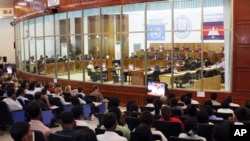The UN-backed Khmer Rouge tribunal has faced growing criticism in recent years for failure to provide justice to victims of the regime. The process has been slow, angering many survivors, and to date only one former regime leaders—Comrade Duch—has seen a verdict read. Only two other leaders remain: Nuon Chea, the regime’s ideologue, and Khieu Samphan, its nominal head of state. And even as the tribunal gears up for the final phase of their trial, criticism of the beleaguered court continues.
Nuon Chea, 87, and Khieu Samphan, 82, have so far undergone one of two phases in their atrocity crimes trial, which was partitioned for the sake of expediency. A verdict in the first phase is expected soon, and an initial hearing in the second phase is slated for later this month.
What happens after their trial is concluded, though, is an open question, and many observers predict that will be the end of the court, which has struggled financially and shouldered criticisms of mismanagement, corruption and political interference almost since its 2006 inception.
Sichan Siv, a Cambodian-American and former US ambassador to the United Nations, told VOA Khmer recently that the tribunal has failed to bring justice to the victims of the regime. The court, heavily funded with money from international donors, has become “a symbol of injustice” and a “slap in the face to victims,” he said.
Sichan Siv said the tribunal should have sought the death penalty for leaders, too.
“If they had killed my mother, my friends, my neighbors, my people—almost 2 million of them—I would want them dead,” he said. “If there is no death sentence, there’s no justice for those who have committed that kind of crime.”
However, Craig Etcheson, former investigator at the ECCC told VOA Khmer by phone recently that the death penalty is impossible.
“People who wish to see the death penalty imposed by the Khmer Rouge tribunal should focus their efforts on changing the constitution of Cambodia, which prohibits the death penalty,” he said.
Duch was sentenced to life in prison for his role as supervisor of the notorious Tuol Sleng detention center, where perceived enemies of the regime were sent to be tortured into confessions and later executed.
Two other aging regime leaders, Ieng Sary and Ieng Thirith, did not see their day in court. Ieng Thirith, the former social affairs minister of the regime, was found mentally unfit to stand trial, and her husband, Ieng Sary, the former foreign minister, died in tribunal custody.
Ear Sophal, a Cambodian-American academic and author, says the tribunal has disappointed a lot of people through its procedures. Duch’s original sentencing was 30 years in prison, commuted to 19, which angered a lot of people, even though he was ultimately given a lifetime sentence, Ear said.
Political interference, corruption and compromise became hallmarks of the court, he said, which led to disappointment, even in the Duch case.
“I don’t think there was a single Cambodian who probably thought, oh, this makes sense, you know, this is a good outcome,” Ear Sophal told VOA Khmer recently. “Of course, the international community though this was a good outcome: finally, he’s been found guilty; finally he’s going to jail. But for a lot of Cambodians, this was like rubbing salt in a wound.”
Sichan Siv said the Khmer Rouge tribunal takes too long and costs too much money.
“For a country as poor as Cambodia, do you want to know how many teachers you could train with that money, how many nurses you can provide and how many hospitals and schools you can build? And to spend that much money, to bring these people to injustice, in a way, it’s a waste of resources.”
Etcheson, however, said it would take a lot of time to investigate the millions of crimes committed by the Khmer Rouge while it was in power.
“One of the key goals of Khmer Rouge tribunal was to demonstrate to Cambodians in Cambodia how the rule of law works in a proper context,” Etcheson said. “The defendants have many rights, and they exercise all of those rights. This consumes a great deal of time.”
Etcheson said the tribunal was in part an experiment to see how cheaply international justice could be accomplished. It cost only a fraction of the price of other international tribunals, he said.
“$200 million seems a lot of money to you and me, but if you think about the 2 million or more victims of the Pol Pot regimes, the $200 million cost of the Khmer Rouge tribunal would add up to investing $100 per person who was killed by the Khmer Rouge,” he said. “And I don’t think $100 per victim is too much to pay for seeking justice.”
Meanwhile, the tribunal has made only five indictments, and ultimately trying just three people. By comparison, the Yugoslavian war crimes trials saw 161 indictments, trials in Rwanda saw 95 and in Sierra Leone saw 22.








